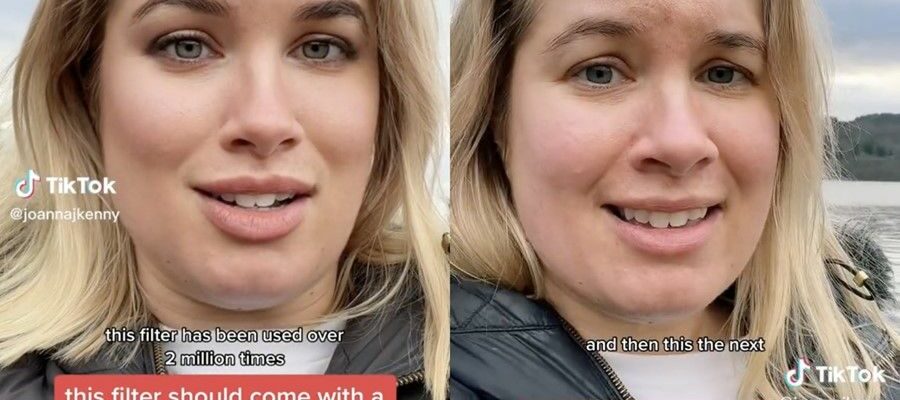Raised cheekbones, luscious lips, perfectly smooth skin… What if it were possible, in a few clicks, to beautify yourself in a completely realistic way, without it being detectable? This is what the brand new “Bold Glamour” (“daring glamour”) filter, which has been a hit on TikTok for a few weeks, promises. Already used in more than 8 million videos on the platform, this new generation filter does not just apply effects with 3D images, but uses artificial intelligence to erase the small roughness of your face, and thus stick to the most close to the canons of beauty conveyed by social networks.
If the traditional beauty filters available on apps tend to fade when a user puts their hand in front of their face, the “Bold Glamour” does not move. “I don’t look like this at all, but the filter looks so natural, with real texture on the skin. It’s just subtle enough to stay yourself and be convincing, ”says a TikTok user. “This filter works on smartphones, it is accessible by billions of people, without any technical knowledge required, in real time, and it seems completely credible”, recognizes Memo Akten, professor at UC San Diego Visual Arts.
“A filter that can cause dysmorphophobia”
On TikTok, it is almost undetectable if we do not pay attention to the small mention “Bold Glamour” at the bottom left. A stunning filter, sometimes destabilizing, that many Internet users have tested, denouncing the impact that such a tool can have on self-esteem, especially among the youngest. “How to feed the lack of self-confidence”, writes a user in the caption of her video on TikTok. “This filter must be banned. If you don’t want to ruin your day, don’t try it. Because all he’s going to do is make you feel like shit,” another user added. “This filter should be illegal, I wish you all not to fall into dysmorphophobia”, also explains a user of the platform.
These small “touch-ups” made possible by artificial intelligence can indeed have harmful effects on well-being and mental health. “By dint of looking at oneself through filters that erase any imperfection, the slightest physical defect becomes an obsession. This can lead to a form of positive alienation from a face that ultimately no longer corresponds to who we are. And subsequently generate phenomena of dysmorphophobia [obsession pour une petite imperfection ou un défaut imaginaire] “, explains to 20 minutes Michaël Stora, psychologist, psychoanalyst and founder of the Observatory of digital worlds in the human sciences. “With this filter, there is no longer the notion of fun, the playful side. It is so realistic that it only reinforces the fact that the self-image is failing”.
A standardized beauty standard
In a video posted on TikTok, Californian surgeon Monica Kieu, who specializes in facial plastic surgery, acknowledged that this filter was very impressive, but underlined how so-called “traditional” beauty canons (finer features, skin perfect, well-defined eyebrows…) seem to govern it. “The biased reflection of this kind of filters therefore risks integrating illusory and arbitrary standards of beauty into the collective imagination,” she explains.
Above all, this risks creating “a standardization of faces”, notes Michaël Stora. “Today, young people no longer want to look like celebrities, but like an improved form of themselves, with standardized criteria. We were already in a clone war, but here we are reaching a peak. It’s the idea that there is a universal canon of beauty that everyone should look like,” explains the psychologist and psychoanalyst, who fears that “this kind of filter pushes even more young people, – 18-30 year olds – , to resort to cosmetic medicine or surgery in order to correspond to a “filtered” self”.

